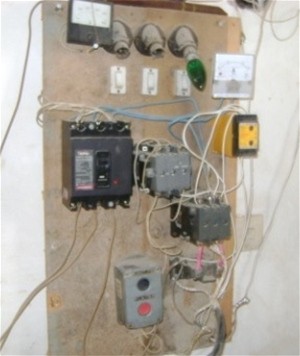
One of 51 panel boards the MSBU identified to be repaired or replaced with new ones.
USAID/CAWSA
CAWSA emphasizes the need to help MSBU solve real problems to improve water service
Because of the training and then new maintenance planning process, USAID's CAWSA grant program is providing $10,000 in repairs and new equipment to protect $100,000 worth of pumps and motors.
12 SEPTEMBER 2010 | MAZARI SHARIF, AFGHANISTAN
Quality water has long been an issue in Afghanistan. To improve water quality and the way its water utility operates, the Mazar-i Sharif Strategic Business Unit (MSBU) of the Afghan Urban Water Supply and Sewerage Company changed from a state-owned department to a private company in order to transform provincial water departments into commercially viable entities.
To assist in this endeavor, USAID funded the Commercialization of Afghanistan Water and Sanitation Activity (CAWSA) project, implemented by the International City/County Management Association (ICMA), which provides training and technical support to the MSBU.
After a pump failure recently interrupted service, CAWSA made an emergency repair grant for MSBU to quickly restore service, then looked at what happened to help prevent a recurrence.
CAWSA learned that the failure was due to the burnout of a central pumping station motor caused by faulty wiring and a failed electrical panel. CAWSA then analyzed MSBU records to see if such failures were common. Results showed valuable pumps and motors were often failing and the service life of many pumps was as low as 30 percent of acceptable standards. CAWSA asked the Mazar power utility to send a technician to provide training in inspection and prevention of critical pump station electro-mechanical and electronic components.
An MSBU inspection found 51 electronic panel boards malfunctioning, some due to bad wiring, the majority needing to be replaced. Additionally, thirty 30-kilowatt transformers needed replacement or repair.
As a result of this training and the new maintenance planning process, USAID’s CAWSA grant program is providing $10,000 in repairs and new equipment that will protect and extend the life of more than $100,000 worth of pumps and motors. This program will reduce future system failures and ensure that the residents of Mazar will enjoy an uninterrupted water supply.
The collaborative relationship between Mazar’s water utility and its power utility is working for the benefit of all the residents of Mazar.







Comment
Make a general inquiry or suggest an improvement.